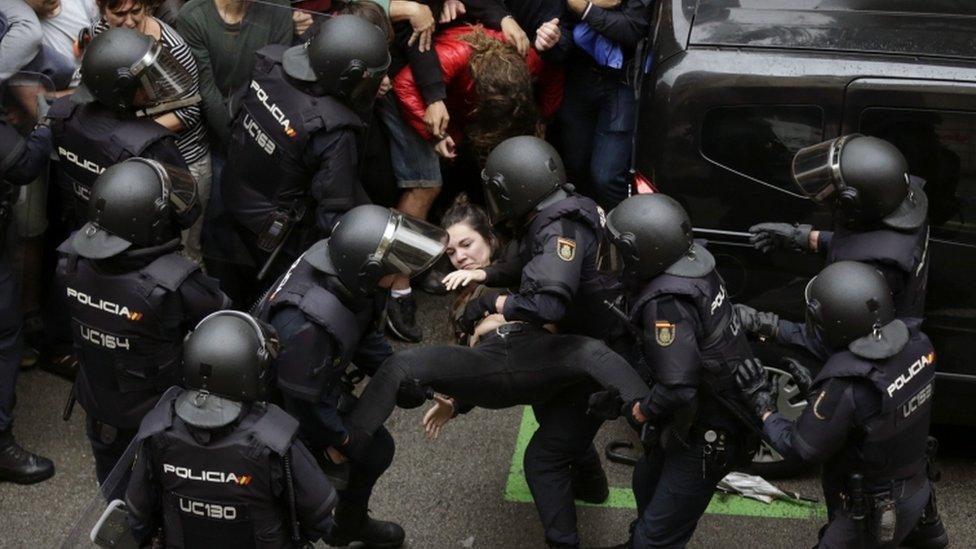Scottish independence: Labour candidate Lisa Nandy criticised for Catalonia remarks
- Published
Lisa Nandy said socialists across the world had been "beaten over and over" by nationalists
A Labour leadership candidate has claimed that the UK should "look to Catalonia" for lessons on how to defeat Scottish nationalism.
Lisa Nandy made the comments as she argued that a "social justice agenda" could beat "divisive nationalism".
Hundreds of people were hurt when the Spanish authorities used force to try to stop the disputed independence referendum in Catalonia in 2017.
Nicola Sturgeon said people would be "mortified" by Ms Nandy's remarks.
And Scotland's only Labour MP, Ian Murray, warned all of the candidates in the party's leadership contest that they should not "come up to Scotland and talk about things that you're not quite sure what you're talking about."
In an interview with the BBC's Andrew Neil Show, Ms Nandy said that socialists across the world had been "beaten over and over" by nationalists.
She added: "We should look outwards to other countries and other parts of the world where they have had to deal with divisive nationalism and seek to discover the lessons where, in these brief moments in history in places like Catalonia and Quebec, we have managed to go and beat narrow divisive nationalism with a social justice agenda."
The Wigan MP was challenged by Neil, who put it to her that the SNP's brand of nationalism is not "hard right" and instead goes "hand in hand with social justice".
Ms Nandy responded by arguing that it suits the SNP to keep the argument about independence going because it meant no one in Scotland was "paying attention to their record, which is frankly appalling".
And she said she does not want another vote on independence as "I think this country has had enough of referendums".

Hundreds of people were hurt as Spanish police attempted to stop the Catalan referendum in 2017
In a referendum on 1 October 2017, which was declared illegal by Spain's Constitutional Court, about 90% of voters backed Catalan independence - although the vote was boycotted by most opponents of independence, and the turnout was only 43%.
The referendum was marred by violent clashes as police used batons and fired rubber bullets in an attempt to prevent it going ahead.
Nine pro-independence Catalan leaders were subsequently jailed for between nine and 13 years for their role in organising the vote, with the sentences sparking further violent clashes between police and protestors.
In a blog post published after the interview, external, Ms Nandy said that socialists in Catalonia have "for years been peacefully resisting the advance of separatists there".
And she argued that "recent indications suggest that their democratic efforts may well succeed" and that there are "hopeful signs their approach of socialism and solidarity - which stands in stark contrast to the unjustified violence we saw from the Spanish police operating under the instruction of Spain's then right wing Prime Minister Mariano Rajoy - may yet win out."
Ms Nandy's remarks were raised in the Scottish Parliament on Thursday, with Ms Sturgeon saying that she assumed the Labour MP "hasn't paid attention to what has actually happened in Catalonia in recent times".
The first minister added: "If she had, she would surely not have suggested that there are any positive lessons at all to be learned from that.
"Perhaps Lisa Nandy should take the opportunity to clarify exactly what she did mean, recognise the concern that it has caused, and perhaps even apologise for that."
Meanwhile, Mr Murray indicated his displeasure at Ms Nandy's intervention as he formally launched his campaign for the party's deputy leadership.
The Edinburgh South MP told journalists: "I say this to all leadership and deputy leadership candidates: Please don't come up to Scotland and talk about things that you're not quite sure what you're talking about."
Ms Nandy is one of five candidates who remain in the contest to replace Jeremy Corbyn as Labour leader, with the winner being announced on 4 April.